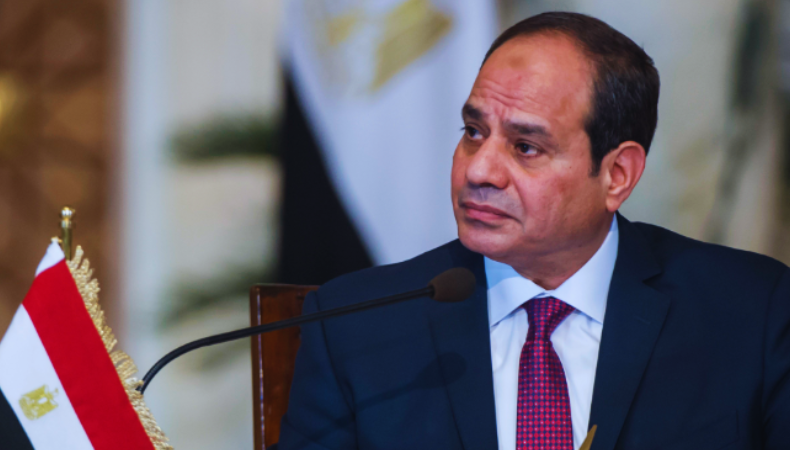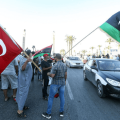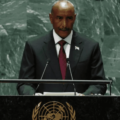Egypt’s Al-Sisi Balances Pragmatism and Antipathy in Dealing with Muslim Brotherhood Amid Sudan Crisis

In a region where political landscapes are as shifting as the sands, President Abdel Fattah al-Sisi’s government in Egypt has been walking a tightrope between maintaining internal stability and navigating complex regional relationships, particularly with the Muslim Brotherhood and neighboring Sudan.
Since the military coup of 2013, which ousted the first democratically elected president, Mohammed Morsi, from the Muslim Brotherhood, Egypt has seen a significant shift in its approach to political Islamists. The Brotherhood, which once held a majority in the Egyptian parliament, has been systematically dismantled by Sisi’s government. The recent upholding of death sentences for 12 members, including senior leaders, underscores the regime’s hardline stance.
President al-Sisi views the Muslim Brotherhood as a terrorist movement, necessitating stringent measures to safeguard Egypt from Islamist threats. Nonetheless, the escalating conflict in Sudan compels Cairo to engage pragmatically with al-Burhan’s regime, despite its ties to the Brotherhood. Echoing Egyptian journalist Hany Ghoraba, Egypt’s primary concern lies in ensuring stability along its southern border, spanning 793 miles with Sudan. Ghoraba notes, “There are millions of Sudanese refugees already in Egypt and the current turbulent situation in Sudan only helps increasing their numbers and troubles in the southern border.”
Regional Dynamics: Strengthening Ties with Sudan
On the international front, President Sisi has been fostering a relationship with Sudan’s transitional government. Discussions have focused on mutual cooperation and support during Sudan’s delicate transition period. However, relations have been strained over territorial disputes and Sudan’s harboring of Muslim Brotherhood members.
Egypt’s strategic overtures towards Sudan stem from a desire to bolster stability amidst ongoing turmoil. General al-Burhan’s government, locked in a fierce battle with the Rapid Support Forces (RSF), seeks Egypt’s support for survival against genocidal militias. According to Ghoraba, “Al-Burhan needs Egypt for survival against the genocidal militias of the Rapid Support Forces.” The Sudanese conflict, fueled by external and regional actors, threatens to destabilize the entire region, necessitating Egypt’s intervention to mitigate potential spillover effects.
The balancing act continues as Egypt seeks to assert its influence while managing its internal political challenges. President Sisi’s administration remains firm in its policies towards the Muslim Brotherhood, viewing the organization as a threat to national security, while simultaneously striving to maintain a strategic partnership with Sudan amidst regional upheavals.
Simultaneously, Egypt continues its crackdown on the Muslim Brotherhood within its borders. Recent death sentences handed down to top Brotherhood leaders underscore Cairo’s resolve to suppress any resurgence of the organization. Adel Ibrahim, observer general of Sudan’s branch of the Muslim Brotherhood, lamented, “Sudan and its people will pay the price of this war from the blood, security and safety of its people, as well as from the sovereignty, unity and collapsed economy.” Al-Sisi’s government aims to neutralize the group’s leadership to prevent any challenges to its authority.
Keep Reading
General al-Burhan’s alignment with Iran raises eyebrows, amidst concerns of Sudan turning into a client state. Sudan’s control over one side of the Red Sea entrance, coupled with Iran’s geopolitical ambitions, accentuates regional insecurities. Concerns raised by Egyptian Interior Minister Mahmoud Tawfik regarding Hamas’s ties to the Brotherhood further complicate matters. Tawfik claimed in January that his government had thwarted the Brotherhood’s alleged efforts to create 129 terrorist cells.
Egyptian President al-Sisi’s intricate diplomatic dance reflects the complexities of regional geopolitics and domestic security imperatives. Balancing antipathy towards the Muslim Brotherhood with pragmatic engagements in Sudan underscores Cairo’s commitment to safeguarding its interests. As external pressures mount and internal challenges persist, Egypt remains steadfast in its pursuit of stability amidst a volatile regional landscape.








